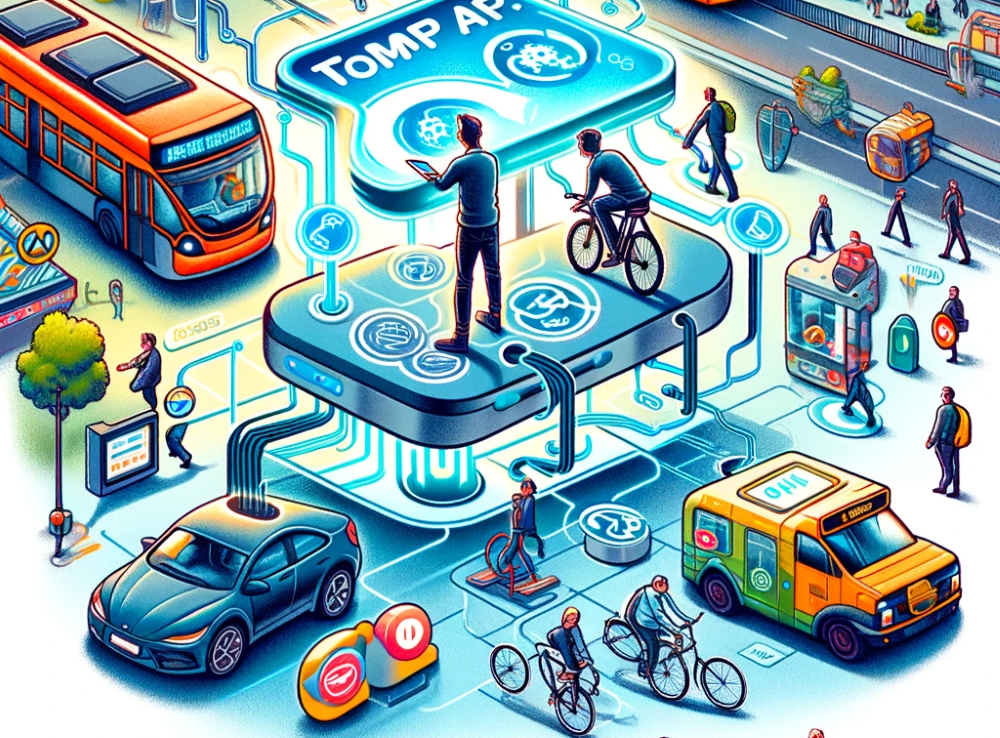The National Mobility Data Access Point (NTM) has taken the lead in exploring five scenarios for the future management of the TOMP API.
The future of the TOMP API, a crucial technical standard for communications between shared carriers and MaaS service providers, is currently at a crossroads. This standard, which was mandatory in the framework agreement for the seven MaaS pilots of the Dutch Ministry of Infrastructure and Water Management from 2018 to 2022, has already had a significant impact in the mobility sector with at least fifty implementations.
Effectively managing technical standards such as the TOMP API is essential for their continued relevance and alignment with market needs. The current uncertainty about how to organize the management of the TOMP API in the coming years underlines a broader challenge in the technology and transportation sectors. The main concern is obtaining financing for the maintenance and further development of the standard. There is also the desire, and possibly the need, to regulate the management of the standard internationally, which adds an extra dimension of complexity.
The management of the TOMP API must be secured in the short term - read: financed – to be.
The National Mobility Data Access Point (NTM) has played a key role in exploring these challenges. They engaged experts from the field to investigate possible management scenarios for the TOMP API. The findings of this study are critical as they will set the direction for the future management of this influential standard.
The TOMP API is one of a kind: there are no other standards that support both scheduling and paying as well as making booking MaaS rides possible. What that the standard meets a need. That offers opportunities for further development European and international assurance.

The situation reflects a broader trend in technological development where the integration of standards and their management are becoming increasingly international in character. This requires careful consideration of different interests and cooperation between various stakeholders in the sector. The success of the TOMP API and similar initiatives will depend largely on how well these challenges are addressed.
research
The NTM document “The Way Forward with the TOMP API” provides an in-depth analysis of the future options for managing the TOMP API, a crucial technical standard for Mobility as a Service (MaaS). This standard, developed at the initiative of the Dutch Ministry of Infrastructure and Water Management, facilitates communication between carriers and MaaS service providers and has already been implemented in at least fifty projects since its introduction in 2018.
A central theme in the document is the need for effective governance for the TOMP API. Despite the successful implementation in various MaaS pilots and the international potential, the TOMP API faces challenges in the areas of maintenance, further development and international management. The financing and organizational structure of management are crucial for the future viability and effectiveness of the standard.
The report concludes that none of the five proposed scenarios offers a simple solution. A significant effort is required at both technical and organizational levels to achieve sustainable management of the TOMP API to realise. The recommendations include a market consultation, providing a short-term solution, exploring international management and pursuing European reference standard status.
and what now?
This complex situation surrounding the TOMP API shows how essential technical standards are in today's mobility landscape, but also how challenging it can be to effectively manage and finance these standards in a rapidly evolving and internationally interconnected sector.
The recommendations are great next steps to the high-level analysis of this report. The Strategic Committee could give instructions for the market consultation to be carried out at short notice. The Change Advisory Board can then advise on the scenario to be chosen and describe the impact on support and finances. Based on these results, the Strategic Committee can determine the further course of action and make an appropriate decision on the desired scenario.
NTMs
NTM, it National Access Point Mobility Data, has supported the technical MaaS standards since January 1, 2023. In this way they help the community (partnership) of municipalities, MaaS service providers and carriers to further develop the standards they already use.
An important instrument for MaaS to succeed is the use of mobility data. If we want travelers to be able to book and pay for their trip in one place, the data of all carriers must be known, available, usable and reliable. Interoperability plays an important role in this. NTM will make the latter possible by supporting the communities with the three MaaS standards: TOMP-API, CDS-M, and Open Wheels.
NTM also supports the Strategic Committee and is (temporarily) chairman of the newly established Change Advisory Board (CAB). This board assesses the proposed changes and extensions within the standards and estimates the impact on governments and carriers.





